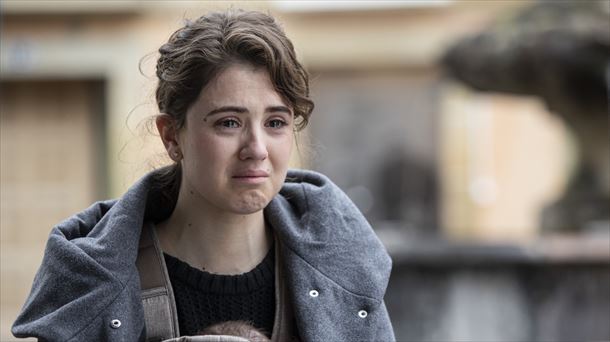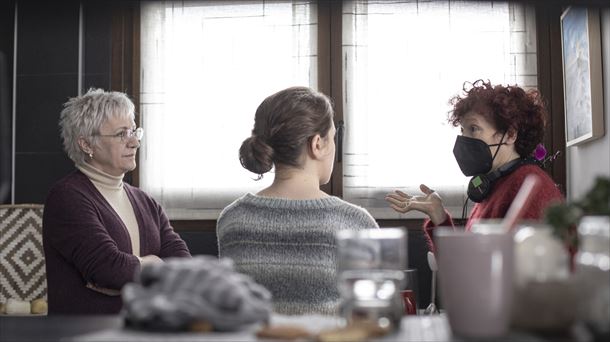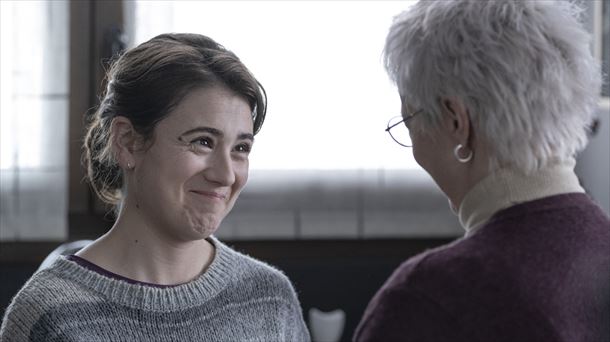“Maixabel”, one of last year’s film events, is up for fourteen Goya awards at the award ceremony to be held this coming Saturday, February 12, in Valencia. One of them is the one chosen by the actress Mary Cherry (Barakaldo, 1993) in the category of best new actress for her moving performance as Maria Jauregi, daughter of the politician assassinated by ETA Juan María Jauregui.
On the eve of the main night of Spanish cinema, we talked to Cerezuela about how she feels about the appointment, what it was like to play a real person like Maria Jauregi and her work in the film, directed by Icíar Bollaín and in which EITB participates.
Zorionak for the nomination, Maria! How did you receive the news?
I was with my sister and my mother in Berlin. None of the three of us had mobile data to listen and see the reading of nominees and nominees, but my mother was able to connect for a while and we could see it.
Well, actually the one who saw it and gave me the news was my sister, since I was very nervous. I held on to my mother’s arm until I heard my sister yell, “Yes! Yes!” Then, the three of us hugged very tightly. It was very emotional.
Did you expect it, even though maixabel be your first feature film?
Really, at no time did I think I could be nominated. During the shoot, I only thought about doing my job well. Although I would be lying if I told you that at no time have I dreamed of it.
When there were a few days left for the announcement of the nominations, he gave it up for lost.

Mary Cherry
What has it been like playing Maria Jauregi?
Maria Jauregi has been the person who, after my family, has given me the greatest life lesson.
Playing a real character, who exists, who watches you, is very difficult because you have a lot of responsibility on you. I have learned a lot on a professional level, but I think I have learned more on a personal level.
Maria has taught me what love, generosity and empathy really are. Both she and Maixabel are incredible women. It is as if they do not belong to this earth. With her I have learned not to be so selfish, which is something that characterizes us humans so much; to look more for what the other person needs or wants and not so much for what we want.
I will be eternally grateful to Maria.
What limits does working on real material impose on you?
Respect and responsibility. But I think there are also advantages: there are eyes to look at and a voice to listen to.
Have you had a relationship with Maria herself before playing her?
Yes. I met her before we started shooting.
I was very nervous. I arrived half an hour before her appointment, and, as soon as I had her in front of me, I told her that I didn’t want to interview her, or get information from her. In the end we were talking about a lot of things that had nothing to do with the topic. And it was wonderful.
Being able to feel his energy was what helped me tackle the role.

María Cerezuela, between Portillo and Bollaín
How has it been working with people as experienced as Iciar Bollaín, Blanca Portillo and Luis Tosar?
A luxury in every way. And among these three monsters we must also mention Urko Olazabal. Working with all four has been a gift.
Icíar is a being of light, a professional who knows what she wants and how she wants it; a director who accompanies, listens, respects and values the actor or actress.
Blanca took great care of me, and for me she will always be a very special person and whom I love very much.
And with Luis I did not have the privilege of being so much, but he is a magical being and very funny.
What relationship did you have during the filming?
From the beginning there was an atmosphere of dedication and tremendous respect. Both the technical and the artistic team went hand in hand, and our body and mind were 100% in the film.
How do you disconnect emotionally after shooting scenes like the one in the swamp, where Maria finds out about her father’s murder?
Breathing and releasing. That day was the one that I felt the most that we all worked together. That day we hugged a lot.
How do you work the implication and the distancing of those emotions?
I am an actress who trusts her intuition a lot, so before shooting this sequence, I took a break from the team.
I walked along the shore, closed my eyes and thought of Maria.

Maria Cerezuela and Blanca Portillo (‘Maixabel’)
How do you imagine the night of February 12?
Surrounded by my team, my friends, my family and my boy. And from there, enjoy.
How would you like it to develop?
In the way that makes the people I love and I happy that night.
What films, whether or not they were nominated for Goyas, have caught your attention in the last year?
“Ama”, by Julia de Paz. Both the plot and Tamara Casellas seem brilliant to me. She was my bet not only to be nominated, but also to win the Goya.
“Libertad”, by Clara Roquet, also calls me a lot.
Do you have a project in hand?
Right now I’m in a project that has nothing to do with what I’ve done so far. It’s a completely different record, and I like that.
What would you like to be able to work on?
In the theater. I miss him very much.
Source: Eitb
Mario Twitchell is an accomplished author and journalist, known for his insightful and thought-provoking writing on a wide range of topics including general and opinion. He currently works as a writer at 247 news agency, where he has established himself as a respected voice in the industry.











